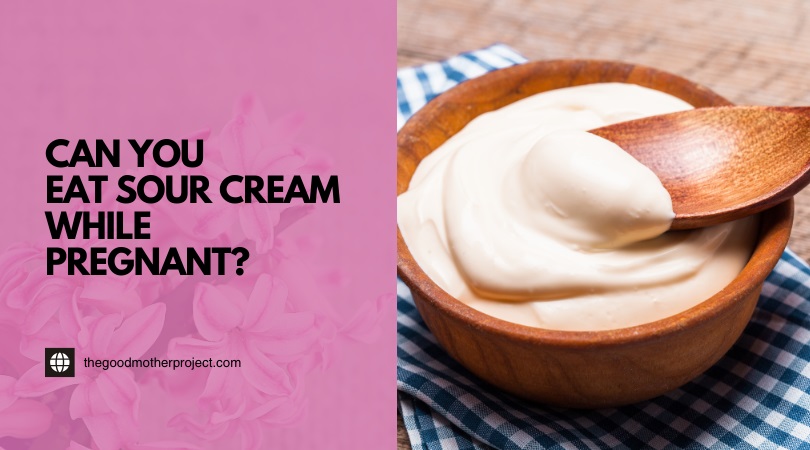Last Updated on January 6, 2025
Yes, you can eat sour cream while pregnant, as long as it’s pasteurized. Always check the label to ensure safety.
Pregnancy comes with numerous dietary guidelines to ensure the health of both mother and baby. One common question is about consuming dairy products, particularly sour cream. Many women wonder if sour cream is safe during this crucial time. Sour cream can be a delicious addition to meals, offering a creamy texture and tangy flavor.
However, it’s essential to choose pasteurized sour cream to avoid harmful bacteria. Pregnant women should prioritize foods that promote wellness and safety. Understanding what’s safe to eat can help you make informed choices while enjoying your favorite dishes. Always consult with your healthcare provider for personalized advice.
The Nutritional Benefits Of Sour Cream During Pregnancy
Sour cream offers several nutritional benefits for pregnant women. It provides essential nutrients that support both mother and baby. Understanding these benefits can help you make informed dietary choices.
High In Calcium
Sour cream is a great source of calcium. This mineral is crucial during pregnancy. It helps in building your baby’s bones and teeth. Here are some key points about calcium in sour cream:
- Supports fetal bone development.
- Reduces the risk of osteoporosis for mothers.
- Helps with muscle function and nerve signaling.
A single serving of sour cream can provide approximately 10% of your daily calcium needs. This makes it an easy way to boost your calcium intake.
Probiotics For Digestive Health
Sour cream contains probiotics, which are beneficial bacteria. These help maintain a healthy gut. Pregnancy can alter digestion, making probiotics especially helpful. Here’s why they matter:
- Improve gut health.
- Enhance nutrient absorption.
- Reduce bloating and constipation.
Including sour cream in your diet can support digestive health. This can lead to a more comfortable pregnancy experience.
| Nutritional Component | Benefit |
|---|---|
| Calcium | Supports bone development and reduces osteoporosis risk |
| Probiotics | Improves gut health and nutrient absorption |
Potential Risks Of Consuming Sour Cream While Pregnant
Pregnancy brings many dietary changes. It’s crucial to know what to avoid. Sour cream may seem harmless but has potential risks. Understanding these risks helps ensure a healthy pregnancy.
Listeria Concerns
Sour cream can harbor harmful bacteria, especially Listeria monocytogenes. This bacteria can cause serious illness. Pregnant women are at higher risk for Listeria infection.
- Symptoms of Listeriosis include:
- Fever
- Muscle aches
- Nausea
- Headaches
In severe cases, Listeria can lead to:
- Miscarriage
- Preterm labor
- Stillbirth
To reduce risk, choose pasteurized sour cream only. Always check labels carefully.
High Fat Content And Gestational Diabetes
Sour cream often contains high levels of fat. Consuming too much fat can lead to weight gain. Weight gain increases the risk of gestational diabetes.
Gestational diabetes can cause complications, such as:
- High blood sugar levels
- Increased risk of cesarean delivery
- Development of type 2 diabetes later
Moderation is key. Opt for low-fat or non-fat versions when possible. Always consult with a healthcare provider about dietary choices during pregnancy.
Safe Consumption Guidelines For Sour Cream
Pregnancy brings many dietary changes. Understanding safe foods is crucial. Sour cream can be enjoyed, but guidelines must be followed.
Opting For Pasteurized Versions
Choose pasteurized sour cream for safety. Pasteurization kills harmful bacteria. This reduces risks for pregnant women.
- Check labels before buying.
- Look for “pasteurized” on the packaging.
- Avoid unpasteurized products completely.
Brands usually provide pasteurized options. These are safe for consumption during pregnancy.
Moderation Is Key
Enjoy sour cream in moderation. This keeps your diet balanced. Too much can lead to excess calories and fat.
- Limit intake to a few tablespoons.
- Pair it with healthy foods, like fruits or vegetables.
- Avoid sour cream in heavy or rich dishes.
Always listen to your body. If you experience discomfort, reduce your intake.
Frequently Asked Questions
Can Pregnant Women Eat Sour Cream Safely?
Yes, pregnant women can safely eat pasteurized sour cream.
Is Sour Cream Good For Pregnancy Nutrition?
Sour cream provides calcium and healthy fats, beneficial for both mother and baby.
What Types Of Sour Cream Are Safe?
Only consume pasteurized sour cream to avoid harmful bacteria.
Can Sour Cream Cause Foodborne Illness?
Unpasteurized sour cream may pose a risk of foodborne illness during pregnancy.
What Should I Check On Sour Cream Labels?
Always check for pasteurization on sour cream labels before consumption.
Are There Alternatives To Sour Cream During Pregnancy?
Greek yogurt or cottage cheese can be good alternatives to sour cream.
Conclusion
Sour cream can be a safe and tasty addition to your pregnancy diet. Choose pasteurized options to avoid health risks. Moderation is key, so enjoy it in balanced meals. Always consult your doctor for personalized advice. Keep nourishing your body and your baby with safe food choices during this special time.








